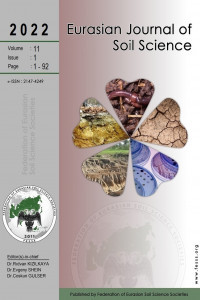Seed priming with NaCl improves germination in maize under saline soil conditions
Maize, NaCl, salinity, seed germination, seed priming, seed growth,
___
- Abraha, B., Yohannes, G., 2013. The role of seed priming in improving seedling growth of maize (Zea mays L.) under salt stress at field conditions. Agricultural Sciences 4(12): 666-672. Ajouri, A., Asgedom, H., Becker, M., 2004. Seed priming enhances germination and seedling growth of barley under conditions of P and Zn deficiency. Journal of Soil Science and Plant Nutrition 167(5): 630-636.
- Asgedom, H., Becker, M., 2001. Effects of seed priming with nutrient solutions on germination, seedling growth and weed competitiveness of cereals in Eritrea. In: Proceeding of the Deutcher Tropentag, University of Bonn and ATSAF. Margraf Publishers Press, Weickersheim, 282p.
- Ashraf, M., Rauf, H., 2001. Inducing salt tolerance in maize (Zea mays L.) through seed priming with chloride salts: Growth and ion transport at early growth stages. Acta Physiologiae Plantarum 23: 407-417.
- Bakht, J., Shafi, M., Jamal, Y., Sher, H., 2011. Response of maize (Zea mays L.) to seed priming with NaCl and salinity stress. Spanish Journal of Agricultural Research 9(1): 252-261.
- Carpıcı, E.B., Celik, N., Bayram, G., 2009. Effects of salt stress on germination of some maize (Zea mays L.) cultivars. African Journal of Biotechnology 8(19): 4918- 4922.
- Chen, X., Zhang, R., Xing, Y., Jiang, B., Li, B., Xu, X., Zhou, Y., 2021. The efficacy of different seed priming agents for promoting sorghum germination under salt stress. PLOS ONE 16(1): e0245505.
- Chutipaijit, S., Cha-um, S., Sompornpailin, K., 2011. High contents of proline and anthocyanin increase protective response to salinity in Oryza sativa L. spp. Indica. Australian Journal of Crop Science 5(10): 1191-1198.
- El-Sanatawy, A.M., Ash-Shormillesy, S.M.A.I., Qabil, N., Awad, M.F., Mansour, E., 2021. Seed halo-priming improves seedling vigor, grain yield, and water use efficiency of maize under varying irrigation regimes. Water 13: 2115.
- Farooq, M., Hussain, M., Wakel, A., Siddique, K.H.M., 2015. Salt stress in maize: effects, resistance mechanisms, and management. A review. Agronomy for Sustainable Development 35: 461–481.
- Harris, D., Tripathi, R.S., Joshi, A., 2002. On-farm seed priming to improve crop establishment and yield in direct-seeded rice. In Direct seeding: Research strategies and opportunities. IRRI, Philippines. pp: 231-240.
- Imran, M., Boelt, B., Mühling, K.H., 2018. Zinc seed priming improves salt resistance in maize. Journal of Agronomy and Crop Science 204(4): 390-399.
- Kaya, C., Kirnak, H., Higgs, D., Saltali, K., 2002. Supplementary calcium enhances plant growth and fruit yield in strawberry cultivars grown at high (NaCl) salinity. Scientia Horticulturae 93: 65-74.
- Marthandan, V., Geetha, R., Kumutha, K., Renganathan, V.G., Karthiyekan, A., Ramalingam, J., 2020. Seed priming: A feasible strategy to enhance drought tolerance in crop plants. International Journal of Molecular Sciences 21: 8258.
- MoAD, 2019. Ministry of Agriculture and Development (MoAD). Statistical information on Nepalese Agriculture 2018/19. Agribusiness Promotion and Statistics Division, Ministry of Agriculture Development, Kathmandu, Nepal.
- Okon, O.G., 2019. Effect of salinity on physiological processes in plants. In: Microorganisms in Saline Environments: Strategies and Functions. Giri, B., Varma, A., (Eds). Springer, Cham. pp 237-262.
- Omuto, C.T., Vargas, R.R., EI Mobarak, A.M., Mohamed, N., Viatkin, K., Yigini, Y., 2020. Mapping of salt-affected soils: Technical manual. Food and Agriculture Organization of the United Nations (FAO). Rome, Italy. 112p.
- Prasanna, B.M., Cairns, J.E., Zaidi, P.H., Beyene, Y., Makumbi, D., Gowda, M., Magorokosho, C., Zaman-Allah, M., Olsen, M., Das, A., Worku, M., Gethi, J., Vivek, B.S., Nair, S.K., Rashhid, Z., Vinyan, M.T., Issa, A.B., Vicente, F.S., Dhliwayo, T., Zhang, X., 2021. Beat the stress: breeding for climate resilience in maize for the tropical rainfed environments. Theoretical and Applied Genetics 134: 1729–1752.
- Tsegay, B.A., Andargie, M., 2018. Seed priming with gibberellic acid (GA3) alleviates salinity induced inhibition of germination and seedling growth of Zea mays L., Pisum sativum Var. abyssinicum A. Braun and Lathyrus sativus L. Journal of Crop Science and Biotechnology 21(3): 261-267.
- Yayın Aralığı: Yılda 4 Sayı
- Başlangıç: 2012
- Yayıncı: Avrasya Toprak Bilimleri Dernekleri Federasyonu
Andrey NOVOSELOV, Alexandr KONSTANTİNOV, Elizaveta KONSTANTİNOVA, Andrey BARBASHEV, Tamara DUDNİKOVA, Iliya LOBZENKO
Gulsun BAYADİLOVA, Asset ZHYLKİBAYEV, Jansulu YESSENBAYEVA, Gulmira YELİBAYEVA, Dauren KAZKEYEV, Venera M. KARASSEVA
Shokan N. KULZHANOV, Saule Z. KAZYBAYEVA, Tolepbergen S. TAZHİBAEV, Laura A. AZHİTAEVA, Maira YESSENALİYEVA
Lelenda Florent KEBALO, Sezai DELİBACAK
Snowie Jane C. GALGO, Victor B. ASİO
Tatiana MİNNİKOVA, Sergey KOLESNİKOV, Anna RUSEVA, Kamil KAZEEV, Tatiana MİNKİNA, Saglara MANDZHİEVA, Svetlana SUSHKOVA
Ganesh MAHARA, Rajendra BAM, Min KANDEL, Sampada TİMİLSİNA, Dhiraj CHAUDHARY, Janardan LAMİCHHANE, Tirtha Raj BAJGAİ, Bhoj Raj PANT, Uttam BHATTARAİ, Jitendra UPADHYAYA
Shoaib AHMED, Matiullah KHAN, Taqi RAZA, Rizwan AHMAD, Javid IQBAL, Neal S. EASH
